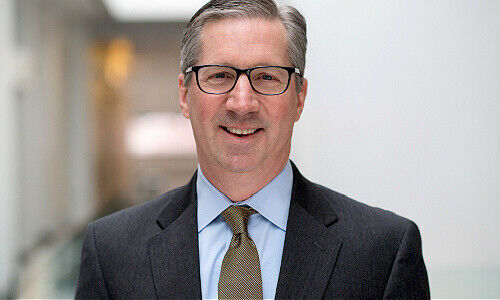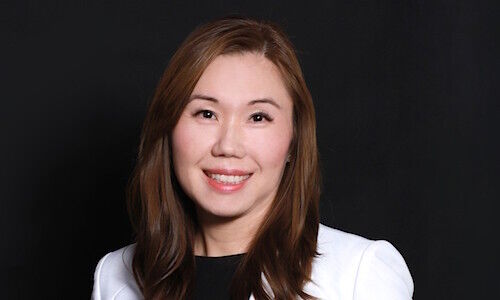Sean Hagerty: «ESG – Engagement Instead of Exclusion»
Investors are increasingly calling for asset managers to divest from certain companies in their portfolios for environmental, social and governance reasons. But is this the only right approach? Sean Hagerty asks in an essay on finews.first.
This article is published on finews.first, a forum for authors specialized in economic and financial topics.
The industry's core mission should be to advocate for all investors, treat them fairly and give them the best chance of investment success. That is why we believe investors should keep their investment costs low and choose funds with broad diversification.
Broad diversification, in turn, means being invested in companies from all market sectors. Yet investors are increasingly calling for asset managers to divest from certain companies in their portfolios for environmental, social and governance (ESG) reasons. But is this the only right approach?
An analysis of ESG equity funds between 2004 and 2018 found that ESG funds have neither systematically higher nor systematically lower raw returns or risk than the broader market. Nevertheless, for some investors, owning certain companies is not consistent with their values. This is particularly true in the context of climate change.
«Of critical importance in this context is the Investment Stewardship Programme»
For this reason, the industry should of course offer fund products that exclude certain companies. But we also believe that ESG investing should allow investors to invest in and engage with portfolio companies in a broad-based index fund. By keeping fund providers remain invested in companies and encouraging them to take positive action against material ESG risks, they can create long-term sustainable value for investors without having to divest from these companies.
Of critical importance in this context is the Investment Stewardship Programme. By engaging with portfolio companies and encouraging their boards to monitor and mitigate all material risks to long-term shareholder value, the stewardship team ensures that investors are protected. These now include ESG risks in particular.
We believe that engagement with boards and management teams can help establish good governance practices, drive meaningful change and support long-term value creation. An important aspect of our engagement in this regard is to vote on issues and executive appointments at AGMs.
«This is may even thwart the equitable and orderly transition to a low-carbon economy»
Particularly with regard to climate change, we believe that it is better to own, engage and encourage boards to manage climate risks by transitioning to a low-carbon economy than to exclude and divest. Investors who divest from carbon-producing assets risk selling them on to those who do not want to engage and encourage change. This is not conducive to, and may even thwart, the equitable and orderly transition to a low-carbon economy that investors hope to achieve.
Addressing the risks that climate change poses to shareholders is a top priority for our stewardship team. Therefore, index fund providers should talk to companies about their plans to reduce greenhouse gas emissions and improve their climate-related reporting as they prepare for a lower-carbon future.
«Boards should be held accountable for the clarity of their disclosure plans and progress in implementing them»
Crucially, in our view, boards should be held accountable for the clarity of their disclosure plans and progress in implementing them. To encourage the development of standardized climate-related disclosures, asset managers can, for example, support the Taskforce on Climate Related Financial Disclosures (TCFD).
In addition, the trustees of the International Financial Reporting Standards (IFRS) announced in early November that they will establish an International Sustainability Standards Board to develop harmonized global sustainability disclosures in the interest of all investors.
«This approach best serves the interests of investors»
Companies should also be encouraged to develop appropriate action plans to protect shareholder value in the face of anticipated material risks. These risks may include significant stranded assets or physical climate risks, reputational damage, damaging customer relationships, an adverse competitive position, or the impact of future regulations.
We believe this approach best serves the interests of investors and offers much greater promise than simply divesting from companies that have a poor ESG profile and shifting responsibility to others.
Sean Hagerty is managing director for Vanguard Europe, responsible for leading the operations and distribution efforts of the European business. He joined the firm almost 25 years ago.
Previous contributions: Rudi Bogni, Peter Kurer, Rolf Banz, Dieter Ruloff, Werner Vogt, Walter Wittmann, Alfred Mettler, Robert Holzach, Craig Murray, David Zollinger, Arthur Bolliger, Beat Kappeler, Chris Rowe, Stefan Gerlach, Marc Lussy, Nuno Fernandes, Richard Egger, Maurice Pedergnana, Marco Bargel, Steve Hanke, Urs Schoettli, Ursula Finsterwald, Stefan Kreuzkamp, Oliver Bussmann, Michael Benz, Albert Steck, Martin Dahinden, Thomas Fedier, Alfred Mettler, Brigitte Strebel, Mirjam Staub-Bisang, Nicolas Roth, Thorsten Polleit, Kim Iskyan, Stephen Dover, Denise Kenyon-Rouvinez, Christian Dreyer, Kinan Khadam-Al-Jame, Robert Hemmi, Anton Affentranger, Yves Mirabaud, Katharina Bart, Frédéric Papp, Hans-Martin Kraus, Gerard Guerdat, Mario Bassi, Stephen Thariyan, Dan Steinbock, Rino Borini, Bert Flossbach, Michael Hasenstab, Guido Schilling, Werner E. Rutsch, Dorte Bech Vizard, Adriano B. Lucatelli, Katharina Bart, Maya Bhandari, Jean Tirole, Hans Jakob Roth, Marco Martinelli, Thomas Sutter, Tom King, Werner Peyer, Thomas Kupfer, Peter Kurer, Arturo Bris, Frederic Papp, James Syme, Dennis Larsen, Bernd Kramer, Armin Jans, Nicolas Roth, Hans Ulrich Jost, Patrick Hunger, Fabrizio Quirighetti, Claire Shaw, Peter Fanconi, Alex Wolf, Dan Steinbock, Patrick Scheurle, Sandro Occhilupo, Will Ballard, Nicholas Yeo, Claude-Alain Margelisch, Jean-François Hirschel, Jens Pongratz, Samuel Gerber, Philipp Weckherlin, Anne Richards, Antoni Trenchev, Benoit Barbereau, Pascal R. Bersier, Shaul Lifshitz, Klaus Breiner, Ana Botín, Martin Gilbert, Jesper Koll, Ingo Rauser, Carlo Capaul, Claude Baumann, Markus Winkler, Konrad Hummler, Thomas Steinemann, Christina Boeck, Guillaume Compeyron, Miro Zivkovic, Alexander F. Wagner, Eric Heymann, Christoph Sax, Felix Brem, Jochen Moebert, Jacques-Aurélien Marcireau, Ursula Finsterwald, Claudia Kraaz, Michel Longhini, Stefan Blum, Zsolt Kohalmi, Karin M. Klossek, Nicolas Ramelet, Søren Bjønness, Andreas Britt, Gilles Prince, Salman Ahmed, Stephane Monier, and Peter van der Welle, Ken Orchard, Christian Gast, Jeffrey Bohn, Juergen Braunstein, Jeff Voegeli, Fiona Frick, Stefan Schneider, Matthias Hunn, Andreas Vetsch, Fabiana Fedeli, Marionna Wegenstein, Kim Fournais, Carole Millet, Swetha Ramachandran, Brigitte Kaps, Thomas Stucki, Neil Shearing, Claude Baumann, Tom Naratil, Oliver Berger, Robert Sharps, Tobias Mueller, Florian Wicki, Jean Keller, Niels Lan Doky, Karin M. Klossek, Johnny El Hachem, Judith Basad, Katharina Bart, Thorsten Polleit, Bernardo Brunschwiler, Peter Schmid, Karam Hinduja, Zsolt Kohalmi, Raphaël Surber, Santosh Brivio, Mark Urquhart, Olivier Kessler, Bruno Capone, Peter Hody, Andrew Isbester, Florin Baeriswyl, and Michael Bornhaeusser, Agnieszka Walorska, Thomas Mueller, Ebrahim Attarzadeh, Marcel Hostettler, Hui Zhang, Michael Bornhaeusser, Reto Jauch, Angela Agostini, Guy de Blonay, Tatjana Greil Castro, Jean-Baptiste Berthon, Marc Saint John Webb, Dietrich Goenemeyer, Mobeen Tahir, Didier Saint-Georges, Serge Tabachnik, Rolando Grandi, Vega Ibanez, David Folkerts-Landau, Andreas Ita, Teodoro Cocca, Michael Welti, Mihkel Vitsur, Fabrizio Pagani, Roman Balzan, Todd Saligman, Christian Kaelin, Stuart Dunbar, Fernando Fernández, Carina Schaurte, Birte Orth-Freese, Gun Woo, Lamara von Albertini, Philip Adler, Ramon Vogt, Gérard Piasko, Andrea Hoffmann, Niccolò Garzelli, Darren Williams, Benjamin Böhner, Mike Judith, Gregoire Bordier, Jared Cook, Henk Grootveld, Roman Gaus, Nicolas Faller, Anna Stünzi, Philipp Kaupke, Thomas Höhne-Sparborth, Fabrizio Pagani, Taimur Hyat, Ralph Ebert, Guy de Blonay, Lars Jaeger, Jan Boudewijns, and Beat Wittmann.






















